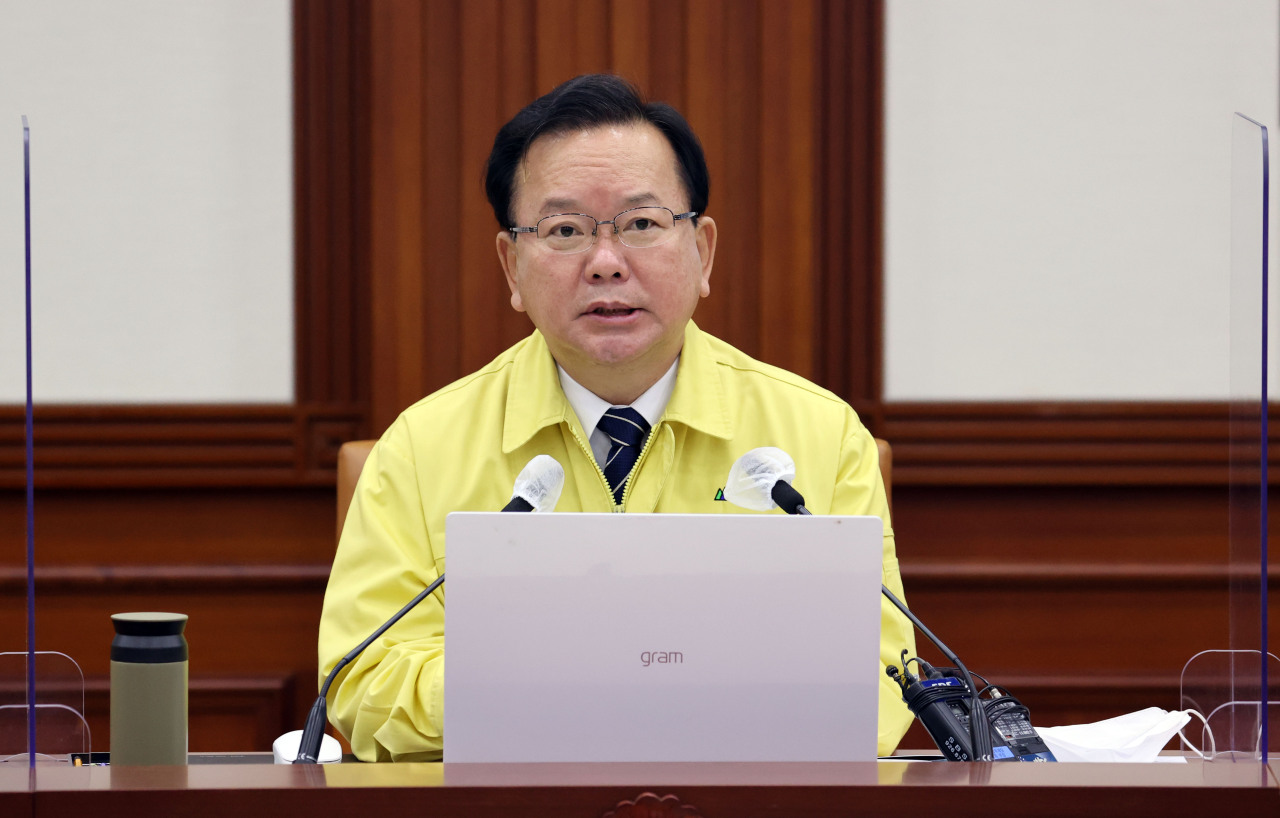Prime Minister Kim Boo-kyum said Wednesday the government was considering implementing stronger social distancing measures as infections continue to surge, and will announce them soon.
As of Tuesday midnight, the number of new daily cases marked 7,850, the highest since the pandemic broke out. The number of severely ill patients increased by 58 from the previous day, reaching the high 900s.
The number of new confirmed cases has been increasing sharply after surpassing 4,000 for the first time on Nov. 24.
“The government is looking at the current quarantine situation very seriously and intends to implement stronger social distancing measures,” Kim said at the COVID-19 Central Disaster and Safety Countermeasure Headquarters Meeting.
“We are considering measures that include further reduction of private gatherings and business hours.”
Kim said the government would finalize and announce this policy as soon as possible.
“If the measures are implemented, we will also come up with appropriate compensation measures for small-business owners and self-employed people who have no choice but to endure the pain again.”
As the more transmissible omicron variant continues to surge, authorities decided to extend the stricter travel restrictions until early next month.
The number of new cases of the omicron variant was 119 for the 24 hours of Tuesday. Among them, 91 were locally transmitted, with the other 28 coming from South Africa and Nigeria.
The government said cases initially occurred mainly in Incheon due to the return of tourists from Nigeria, but now cases are increasingly rising among churches and day care centers in many areas.
To prevent further spread, foreigners seeking a short-term stay from 11 African countries will be restricted from entry until Jan. 6, 2022.
During the period, Koreans and foreign travelers seeking a long-term stay will be quarantined in temporary living facilities for 10 days and undergo four PCR tests – preflight, first day after entry, fifth day after entry and before release.
The 11 countries are South Africa, Namibia, Mozambique, Lesotho, Malawi, Botswana, Eswatini, Zimbabwe, Nigeria, Ghana and Zambia.
Stricter quarantine measures for entrants from all countries will also be extended until Jan. 6.
Koreans and long-term foreigners arriving from all countries must undergo three PCR tests – preflight, the first day after entry and before release) -- and self-isolation for 10 days regardless of whether they are vaccinated or not. Short-term foreign travelers must be isolated in temporary living facilities for 10 days and undergo three PCR tests.
The issuance of quarantine exemptions, which are limited to funeral attendance or public service -- will also be extended until the date.
In the case of travel bubbles previously agreed upon with Singapore and Saipan, quarantine exemptions are being maintained in consideration of mutual trust between them. But quarantine measures such as PCR-negative confirmation are required.
The prime minister said the government would prioritize securing beds and vaccinations as case numbers are projected to reach new highs by the end of the year.
“As the number of severely ill patients has exceeded the highest level every day, the medical response capacity has reached its limit,” the prime minister said. “It is most urgent to prevent exhaustion of medical staff and expand the number of beds to protect lives and operate them efficiently.”
The government plans to secure 5,800 additional beds by the end of the year. To reduce the number of elderly waiting for hospital beds, it will operate six additional nursing hospitals dedicated to infectious diseases.
The number of critically ill patients on Wednesday was 964, the second day in a row that it had exceeded 900. The number of new COVID-19 deaths was 70, the third-highest figure recorded.
“The importance of vaccination cannot be overemphasized,” Kim said.
With the government emphasizing the need for getting a third shot, more than 780,000 people have received a third dose of vaccination so far this week.
The government will set the rest of December as the third intensive vaccination period for the elderly and actively support them to receive vaccinations at nearby medical institutions without prior reservations.
Kim said, “Increasing the vaccination rate for teenagers is also an important goal,” adding, “Fortunately, the reservation rate for primary vaccinations for those between the ages of 12 and 15 has risen to 56 percent as of today.”
The government will provide various ways for teenagers to be vaccinated, such as allowing inoculations on the same day without prior reservations, vaccinations in school and linking vaccinations to medical institutions.
“Regarding various concerns among parents, the relevant authorities will do their best to provide a thoroughly scientific basis so that they can rest assured,” said Kim.
By Shin Ji-hye (
shinjh@heraldcorp.com)








